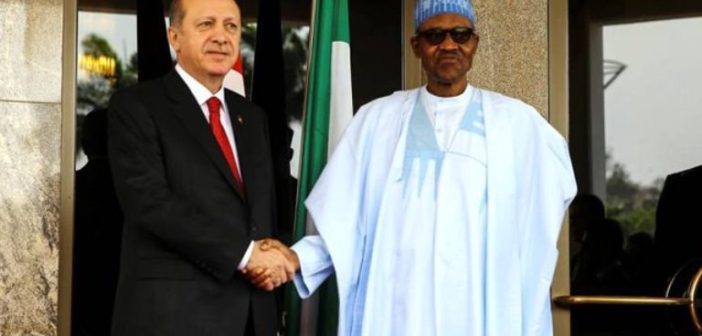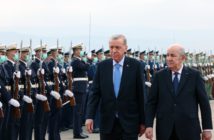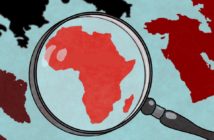Relations between the Turkish and Nigerian peoples was first established during the late 1500’s when Mai Idris Ali Alooma the ‘Mai’ or Sultan of Kanem-Bornu sent a diplomatic mission across the Sahara and the Mediterranean to the Sultan in Istanbul. This was reciprocated by a 200-man ambassadorial party dispatched by the Sultan in Istanbul across the Sahara to the Mai Idris Ali Alooma, thus holding the door open for further trade. Turkish/Albanian musketeers soon served alongside the Shuwa Arab horse cavalry, Kanuri infantry, and other Saharan ethnic groups-based camel cavalry, in the armies of Kanem-Bornu.
Sultan Abdul-Hamid II maintained strong communications and relations with the rulers of Bornu during his time as Sultan of Istanbul and Caliph of the Ottoman Caliphate.
Relations between the Republic of Turkey and Nigeria began in August 1962, when two years after Nigeria gained independence; the Turkish Republic established an embassy in the then capital of Lagos. This embassy was then moved in 2001 to Abuja, the current federal capital.
While both Turkey and Nigeria are Muslim majority countries, and large, potentially hegemonic powers in their immediate vicinity, both countries however for decades during the Cold War and immediate post-Cold War eras focused on integration with the Euro-Atlantic order sphere (in the case of Turkey), and pan-Africanist decolonisation and integration trends (in the case of Nigeria), with the end result being a sub-summation of Turkish national interests by Euro-Atlantic interests, and Nigeria’s strategic national interests in Pan-Africanism, at great expense and little reward for Nigeria.
This situation during past years, ensured that two large countries that could have benefited from independent strategic cooperation dictated solely by their national interests, largely ignored each other beyond diplomatic courtesies. However, with the entry of the Justice and Development Party (AKP) into rulership of the Turkish Republic at the turn of the century, there has been a growing change in Turkey’s definition of what its strategic interests are.
The growing change in Turkey’s perception of what its strategic interests are, has mostly defined Turkey, as an Islamic and Middle-Eastern country with a distinct identity, that is reclaiming strategic autonomy to pursue its own strategic national interests, while remaining a security partner of the Euro-Atlantic sphere with which it is bound by the NATO Alliance.
Turkey has also pursued economic expansion with Turkish firms establishing offices and entering into new markets across the Middle East, and North Africa. Turkish weapons have found new markets also across the Middle East, including in Qatar and the United Arab Emirates.
While Turkey has been pursuing a redirection of Turkey from being an appendage of Europe to reclaiming its rightful place as a power of significance in its immediate region, Nigeria in 2015 elected a President, Muhammadu Buhari, who has quietly pursued a policy of less Pan-Africanism and more Nigerianism. This growing redirection of Nigerian efforts away from relying on consensus with smaller African states, to taking unilateral actions in service of its own national interests, has seen Nigeria reject the African Continental Free Trade Agreement (ACTFA) until it can assess that it will not be against its national economic interests, a process that was not done by the previous administration while the negotiations for the ACFTA were ongoing. In addition, Nigeria has over the past four years persisted in seeking to balance its traditional relationship with the West by pursuing independent actions and policies, while building new relationships with other powers.
While both Turkey and Nigeria are founding members of the D-8 group of countries, there has been little economic and political coordination between both countries, beyond insubstantial fluffy agreements that has not substantially transformed the relationship between these two countries.
Turkey is a country of some 80 million people and is an emerging market economy, with a strong industrial base. Nigeria is a middle-income country with a population of 200 million people that is rapidly growing. Both countries are placed in a mutually beneficial situation.
Turkish companies and banks need financial liquidity, Turkish exporters need a large market for their goods, Turkey needs energy supplies especially oil and gas that do not come with any geopolitical strings attached (as it does with Iran and Russia) and Turkish construction companies need large scale infrastructural projects to work on. Nigeria on the other hand needs technology assistance which Turkey can provide, Nigeria also needs a lot of infrastructural development, in addition to the Nigerian military requiring arms and defence items which it has not been able to source from elsewhere on favourable terms. It is apparent that both countries possess the raw materials for a deeper engagement over the long term for their mutual benefit, as both Abuja and Ankara grow into their rightful places as leading powers in their own right.
A strategic cooperation framework guiding relations and fostering cooperation between Turkey and Nigeria, would enable both countries to leverage on the advantages offered by each other in such a partnership, to advance their own national interests.
Nigeria could under such a framework, provide preferential access to its massive market to Turkish goods especially agricultural products, semi-processed goods and parts, while Turkey would help Nigeria industrialise. Turkey could help Nigeria with technical assistance in military production, and also carry out joint defence research projects with Nigeria, while selling to Nigeria defence equipment Abuja requires but can neither produce nor buy due to politics.
Nigeria could also help Turkey in ensuring that it achieves energy security, by supplying Turkey with oil and gas. Turkish investment and technology could help further expand Nigeria’s liquefied natural gas (LNG) production.
Turkish construction companies which are world renowned experts in large scale infrastructure building, could help Nigeria fulfil President Buhari’s policy of expanding Nigeria’s transportation and logistics infrastructure by bringing their considerable capacity to bear. With Nigeria having a massive infrastructural deficit including in roads, railways, seaports, housing units etc, this would ensure that the order books of Turkish companies involved whether in construction or infrastructural concessioning under Build, Operate, Transfer frameworks, would be booked for a long time.
Today the value of Turkey’s exports to Germany is $16.1bn, a full-fledged strategic relationship underpinned by economic, security, diplomatic cooperation and reciprocal preferential treatment would ensure that Turkish exports to Nigeria with a population of 200m and rapidly growing, could easily dwarf Turkish trade with Germany by multiples of up to ten.
A roadmap for Turkish-Nigerian Strategic Cooperation
A roadmap for Turkey to expand its relations with Nigeria significantly, would see the Turkish government through its Foreign Trade Authority, build an instituional partnership with the Nigerian Federal Ministry of Trade and Investment, to create mechanisms for Turkish and Nigerian economic actors to invest in each other’s economy. It would seem Turkey’s Maarif Foundation open representative offices in Nigeria, and invest massively in establishing Turkish schools in Nigeria, plus work with the Nigerian government to take government to take over schools still run by the movement of Gulen (FETO) proscribed in Turkey as a terrorist organisation. It will also see the Turkish Scholarship Foundation develop a long-term programme to provide continuous scholarship opportunities for substantial numbers of Nigerian students to study in Turkish universities. It would see the Turkish Foreign Ministry engaging, cultivating and investing substantially in local pro-Turkey actors that can help advance the cause of Turkey-Nigeria Strategic Cooperation, in addition to creating and supporting platforms and initiatives to strengthen advisory/operational level government to government ties through conferences and workshops and summits. Such a roadmap would see the Turkish military invest in building military to military ties with the Nigerian Armed Forces, including military technical cooperation, high level defence conferences, joint exercises etc. Such a roadmap would also see high level Turkish delegations regular visit Nigeria, and the Turkish government invest in having high level Nigerian delegations visit Turkey.
Strengthening relations with Nigeria requires a reassessment of the priorities of Turkey’s Nigerian policy. Turkey-Nigeria relations will need to establish a stronger social base, through cultivating developmental and civil society organisations, providing education and technical growth opportunities for individuals and organisations involved in the development and civil society field in Nigeria, and implement diplomatic programmes to boost cultural and historical solidarity discourses. This is to enhance people to people ties in parallel with government to government ties and economic ties. In order to better understand Nigeria, Turkey will need to work with those Nigerians and Turks, individuals and institutions, who understand Nigeria and can help it navigate through its waters effectively.
It cannot be overstated how much it is in the best interest of both Turkey and Nigeria, that the current relationship between our two countries is upgraded from the current level of friendly but noncommittal relations, to full-fledged strategic cooperation. Hopefully policy makers in Abuja and Ankara will see the unique opportunities presented by the current governments in both and work to establish and institutionalise whole of government engagement for the long term.



